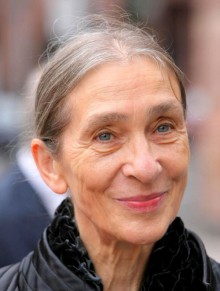Philippina “Pina” Bausch was born in 1940 in Solingen, North Rhine, Third Reich. She studied ballet in Essen and New York. In 1973, she formed a troupe now known as Tanztheater Wuppertal. She departed this life in 2009.
She created not even a style but a new type of spectacle, in which the movement of an actor is the alpha and omega of stage matter. Free of classical limitations, Pina’s dance became a language that is more powerful than the word – it is the experience of borderline cases and balancing over the abysses into which no theater person has ever dared to peep. “I am not that much interested in how people move as in what actually moves them” – these words of Pina express the essence of her system as precisely as possible.
Recently I took а chance to visit Wuppertal and see, in one evening, two most famous productions of Tanztheater – Cafe Mueller and The Rite of Spring based on Igor Stravinsky’s ballet of the same name.
Both plays make an ideal mutually-complementing contrast. Cafe Mueller is a plastique poem set to the cheerless baroque music of Henry Purcell, whereas The Rite of Spring is an irresistible collective ecstasy.
A cafe. Many identical chairs and tables of a neutral dark-gray color. A glass door in the background, another entrance on the left. The action begins: two women wearing long white dresses move, as if in sleep, stretching out their hands hopelessly, but while one of them enters the games with others, the other, once performed by Pina herself and now by an actress who looks like her, remains to the end an unnoticed ghost in her own dream.
Then come a suited man (a waiter, a guest, a guardian or an angel?) who throws around chairs noisily on the way to a woman in white, another male sleepwalker, a bit comical red-curled lady, and a gentleman with a raincoat and glasses who arouses the genuine interest of the red-haired woman. The cafe is a place to meet in, but everybody here has their own line of movements and trajectory of contacts and repulsions. The stories of these partly hypnotized and partly too fussy people are eternal – about the wish for and impossibility of intimacy, about the stubbornness of human will and the desire to place it into someone else’s hands, about oblivion and groping in search of the lost time. In this strange limbo, everybody is doing the same movements and circling around the same micro-events. It is neither life nor death, it is an act of sliding quietly on the borderline of all things; and, even touching each other, all the characters remain on their own, but is it not the case always in the last analysis?
Changing the stage set from Cafe Mueller to The Rite of Spring looks like a separate interlude: stage workers come to disassemble the previous set, roll metal barrels onto the stage, pour mountains of soil out of them and rake it all around.
The Rite of Spring is precisely the rite of the awaking of earth, which is shown as contact between the masculine and the feminine. A bacchanalia, an orgy, a pagan revolt.
The earth aspires for a sacrifice which should be chosen and offered.
While time is non-existent in Cafe Mueller, here there is an attempt to outstrip and tear it apart with human bodies.
The frenzy of dance, coupled with a mathematically exact rhythm of movement, causes a feeling of amazing credibility. It is a true rite that really causes the spring, it is a genuine tribe, it is a real offering that takes place a thousand years before Christ and hundreds of centuries after us, it is an ancient and a future drama in which a part of you also throbs.
The Rite of Spring and Cafe Mueller, ecstasy and sadness, are the two sides of a high melancholy inherent in great artists only, the two reference axes which have nothing accidental, nothing but enormous unendurable knowledge which Pina left to us.








